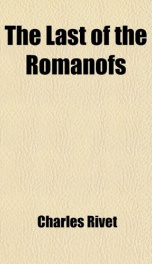the last of the romanofs

Purchase of this book includes free trial access to www.million-books.com where you can read more than a million books for free. This is an OCR edition with typos. Excerpt from book: CHAPTER III THE RUSSIAN GOVERNMENT AS IT WAS The parody of constitutional governmentThe Ministers The ParliamentThe real masters of Russian policy : the tchinovniks who had remained the Guard of IvanPrussian traditionsGerman pushfulnessPolice rule and its victims. But a short while ago there was nothing savouring of constitutional government in Russia but a name. The Almanack de Gotha had since 1905 given to that country the following highly paradoxical definition : a constitutional monarchy under an autocratic Tsar. Even that was an exaggeration. The reforms introduced as the result of the pressure of opinion, the convocation of a Duma which in theory was to constitute a national representation, did not in fact make any alteration at all in the old state of affairs. The system remained the same : the Russian bureaucracy, more royalist than the King, more autocratic than the monarch, gave up no iota of its power or of its prerogatives. As we have seen elsewhere, the deep-rooted ideas of the Tsar were not such as to suggest to him any lessening of his power. He became, consequently,the natural ally of the administrative caste in order to pursue with it a common aim : to get back all that he and it had been compelled to yield under the threat of insurrection. That is why Nicholas II. always took good care that the men he called upon to assist him in the government should come from no other source than that bureaucracy. The Ministers of the last Tsar, excepting Witte, Stolypin, Sazonof, and to some extent Kokovtsof, were officials without any initiative and without any desire but that of obeying orders. These men will be found to have played no part in their country's history, except to dig more and more deeply the pit which separated the rulers from the ruled. C...
Users who have this book
Users who want this book
What readers are saying
What do you think? Write your own comment on this book!
write a commentif you like the last of the romanofs try:
Other books by this author
Do you want to exchange books? It’s EASY!
Get registered and find other users who want to give their favourite books to good hands!


